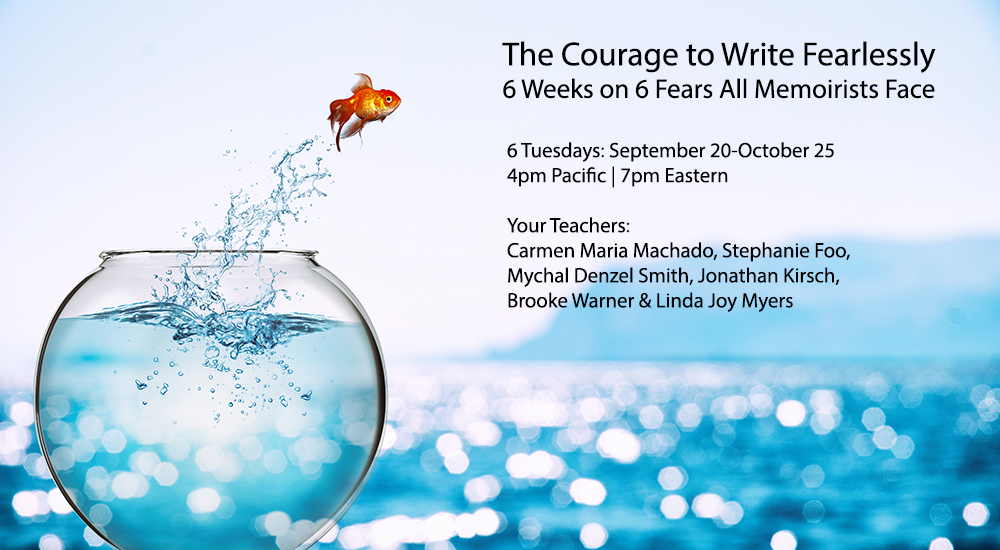
The challenge with overwhelm is the way that it hits us from so many sides. As a writer, you’re not just going to be overwhelmed by the project you’re working on, but also with your responsibilities, your life, the wider world. Overwhelm is a lot like seasonal allergies, in that you’re impacted or at its mercy, and it can come and go in waves. As a writer, you don’t have the luxury of compartmentalizing overwhelm, though it might be helpful to think of overwhelm as something to categorize and shelf. In that way, you can at least understand what the singular components of your particular overwhelm are, and begin to find ways to address it.
When it comes to writing a memoir, writers often confront:
• overwhelm about the scope of the project
• emotional overwhelm, at memories of events or “reliving” things that happened
• overwhelm at how much there is to learn to become a better writer
• overwhelm at how little time there is to dedicate to something they really want to do
• overwhelm that someone else, or many people, have already written the book they want to write
• overwhelm over the many steps that need to happen for a book to someday be published
I’m sure anyone reading this list can add to it, and I encourage you to. What overwhelm looms for you?
Knowing what you’re dealing with is half the battle, and getting specific and granular in your responses is a way to gain some semblance of control, to tamp down the overwhelm, which in my experience can be paralyzing and can result in many writers coming to a full stop, sometimes for months, sometimes for years or forever.
Once you identify what about the writing and publishing experience feels overwhelming, next you’ll want to categorize what else is there. For instance:
• overwhelm by the sheer volume of information we process day-to-day
• overwhelm about the state of the nation and the world
• overwhelm over how busy you might be with other things—a job, raising children, caretaking
• overwhelm over money—which can stymy creativity since survival is more important than creative endeavors
Again here, add to this list and be specific. What are the broader overwhelms in your life?
Overwhelm is a pile-on, and the way most of us react to it is manifested as anxiety. Overwhelm comes and goes because sometimes we have a handle on it, or we get a reprieve from our worries. But when it comes on strong, and if we want to do the work of writing, we need to find ways to be in conversation and/or manage our overwhelm.
To understand your overwhelm, first pinpoint what drives it. For me and many, a new level of overwhelm started in 2016 when Trump became president, in part because my news diet changed. Like a gawker on the side of the road, I couldn’t consume enough media, all of it stoking my anxiety and exacerbating my overwhelm. Identifying this supported me to make a choice to stop engaging in political conversations online, and to reduce my news intake. I still listen to political podcasts, but I do so in moderation since I know I get activated around topic, even though I’m drawn to it.
The most common ways to deal with overwhelm include: deep breathing or meditating; finding ways to change your mental looping, which is why a lot of people watch TV or read a book to try to get out of their own heads; exercising as a way to get in your body; and free-writing or journaling to make sense of what’s going on, or to get the feelings that are trapped inside out and onto the page.
Any of these interventions can work, but the last one is perhaps most important if you want to write through overwhelm. Overwhelm is something to keep at bay, not something to banish. The world is complex, our lives busy, and to suggest you’ll get a handle on your overwhelm, or that there’s some answer to it, is wishful thinking. Instead, we can harness it. We can treat our writing practices as an antidote to our overwhelm. Let your writing be the release from overwhelm that you’re craving. Channel your overwhelm into your writing by giving yourself prompts that lead to writing sessions. Let those prompts be specific, write on them for five minutes, and then enter into a memoir-writing session immediately following.
For instance:
• Today something specific that overwhelmed me was . . .
• The way I feel in my body when I’m overwhelmed is . . .
• Something that helped me feel relaxed this week was . . .
Part of the problem with overwhelm is that it’s big, and it can descend upon us quickly, without warning. If stoked by fear and anxiety, overwhelm is chemical; it actually triggers our nervous system and we have to find ways to address it physiologically. Writing about the specifics of your overwhelm contains it. Identifying the root cause often has the impact of lessening overwhelm’s hold on us.
If you’re dealing with overwhelm, easing into your writing sessions by confronting what’s agitating you directly may feel counterintuitive, but acknowledging its omnipresence, being in relation with it rather than trying to fight it or ignore it, will change your relationship with overwhelm, and, equally important, with your writing practice.

We hope you’ll join us to hear Brooke Warner teach on the topic of How to Overcome the Fear of Overwhelm on Sept 27 (part of our COURAGE TO WRITE FEARLESSLY series). Brooke is a structure nerd who comes to memoir from book publishing and can’t wait to share with you all the ways you can stem the tide of overwhelm during the writing of your memoir. This class will focus on structure, outlining, and organization in order to give you the grounding you may not even know you need yet. Embarking on your memoir will feel exhilarating and fun until it doesn’t—and the tips Brooke will provide from her nearly 20 years of supporting memoirists will help you by giving you the necessary stepping stones to keep overwhelm at bay.
Speak Your Mind